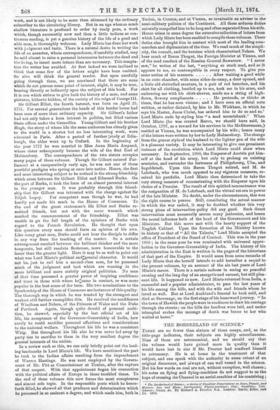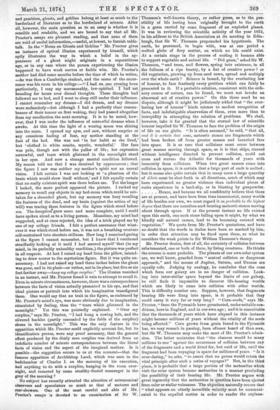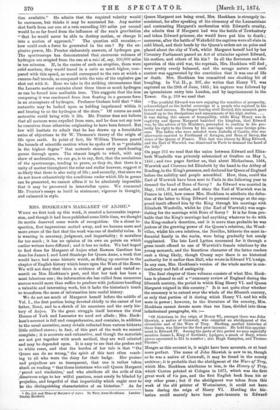THE BORDERLAND OF SCIENCE.* LIEBE are no fewer than sixteen
of these essays, and, as the title-page indicates, their subjects are highly miscellaneous. Nine of them are astronomical, and we should say that the volume would have gained more in quality than it would have lost in size if Mr. Proctor had confined himself to astronomy. He is at home in the treatment of that subject, and can speak with the authority to some extent of an original discoverer, and always of one well versed in the science. But his few words on coal are not, without exception, well chosen ; his notes on flying and flying-machines do not suggest to us the hope of crossing she Channel in an aerial.machine of his contriving ;
• The Borderland of Science; a Series of Familiar Dissertations on Stars, Planets, and Meteors; Sun and Moon; Earthquakes: Flying-machines; Coal; Gambling; Coin eidences ; Ghosts, etc. By Richard A. Proctor, B.A. London: Smith, Elder, and Co. 1873. and gamblers, ghosts, and goblins belong at least as much to the borderland of literature as to the borderland of science. After all, however, the main question as to an essay is whether it is sensible and readable, and we are bound to say that all Mr. Proctor's essays are pleasant reading, and that none of them are void of useful information,—useful, at lowest, to furnish table- talk. In the " Notes on Ghosts and Goblins " Mr. Proctor gives an instance of optical illusion experienced by himself, which aptly illustrates the way in which a belief in the ap- pearance of a ghost might originate in a superstitious age, or in any case where the person experiencing the illusion happened to have weak nerves or feeble wits. Mr. Proctor's mother had died some months before the time of which he writes, —he was then a Cambridge student, and the scene of the occur- rence was his room in his college :—" I had on one evening been particularly, I may say unreasonably, low-spirited. I had sat brooding for hours over dismal thoughts. These thoughts had followed me to bed, and I went to sleep still under their influence. I cannot remember my dreams—I did dream, and my dreams were melancholy—but although I had a perfectly clear remem- brance of their tenour on first waking, they had passed altogether from my recollection the next morning. It is to be noted, how- ever, that I was under the influence of sorrowful dreams when I awoke. At this time the light of a waning moon was shining into the room. I opened my eyes, and saw, without surprise or any conscious feeling of fear, my mother standing at the foot of the bed. She was not in her habit as she lived,' but ' clothed in white samite, mystic, wonderful.' Her face was pale, though not with the pallor of life ; her expression sorrowful, and tears which glistened in the moonlight stood in her eyes. And now a strange mental condition followed. My reason told me that I was deceived by appearances ; that the figure I saw was neither my mother's spirit nor an unreal vision. I felt certain I was not looking at ' a phantom of the brain which would show itself without,' and I felt equally certain that no really existent spirit was there before me. Yet the longer I looked, the more perfect appeared the picture. I racked my memory to recall any objects in my bed-room which could be mis- taken for a shrouded ghost, but my memory was busy recalling the features of the dead, and my brain (against the action of my will) was tracing these features in the figure which stood before me. The deception"grew more and more complete, until I could have spoken aloud as to a living person. Meantime, my mind had suggested, and at once rejected, the idea of a trick played me by one of my college friends. I felt a perfect assurance that what- ever it was which stood before me, it was not a breathing creature sell-restrained into absolute stillness. How long I remained gazing at the figure I cannot remember, but I know that I continued steadfastly looking at it until I had assured myself' that (to my mind, in its probably unhealthy condition,) the picture was perfect in all respects. At last I raised my head from the pillow, intend- ing to draw nearer to the mysterious figure. But it was quite un- necessary. I had not raised my head three inches before the ghost was gone, and in its place—or rather, not in its place, but five or six feet farther away—hung my college surplice." The illusion vanished in an instant, and Mr. Proctor found it vain to attempt to recall it. Even in minute circumstances, however, there was a correspondence between the facts of vision actually presented to his eye, and that ideal picture or portrait into which his imagination transfigured them. One would say that no trait in the figure, as embraced by Mr. Proctor's mind's eye, was more obviously due to imagination, stimulated by feeling, than the " tears which glistened in the moonlight." Yet this was pointedly explained. " Over my surplice," says Mr. Proctor, "I had hung a rowing belt, and the silvered buckles (partly concealed by the folds of the surplice) shone in the moonlight." This was the only feature in the apparition which Mr. Proctor could explicitly account for, but its identification proves, were any proof necessary, that the general effect produced by the dimly seen surplice was derived from an indefinite number of minute correspondences between the literal facts of vision and the aspect of the imagined mother. Is it possible—the suggestion occurs to us at the moment—that the famous apparition of Archbishop Laud, which was seen in the bedchamber of Charles I. on the morning of his execution, had anything to do with a surplice, hanging in the room over- night, and removed by some stealthy-footed messenger in the grey of the morning ?
No subject has recently attracted the attention of astronomical observers and speculators so much as that of meteors and star-showers. One of the most careful and able of Mr. Proctor's essays is devoted to an examination of Sir W.
Thomson's well-known theory, or rather guess, as to the pos- sibility of life having been 'originally brought to the earth in a germ carried by some fragment of an exploded planet. It was in reviewing the scientific activity of the year 1872, in his address to the British Association at its meeting in Edin- burgh, that Sir W. Thomson propounded his hypothesis. The earth, he presumed, to begin with, was at one period a melted globe of fiery matter, on which no life could exist. At a certain stage in the process of cooling it became able to support vegetable and animal life. " Did grass," asked Sir W. Thomson, " and trees, and flowers, spring into existence, in all the fullness of a ripe beauty, by a fiat of creative power ? or did vegetation, growing up from seed sown, spread and multiply over the whole earth ? Science is bound, by the everlasting law of honour, to face fearlessly every problem which can fairly be presented to it. If a probable solution, consistent with the ordi- nary course of nature, can be found, we must not invoke an abnormal act of creative power." On this there need be no dispute, although it might be judiciously added that " the ever- lasting law of honour " binds science to modest recognition of facts, and indefatigable observation of them, even more than to intrepidity in attempting the solution of problems. We shall, however, take it for granted that the eternal law of scientific honour impelled Sir W. Thomson to face the problem of the origin of life on our globe. "It is often assumed," he said, " that all, and it is certain that some, meteoric stones are fragments which had been broken off from greater masses and launched free into space. It is as sure that collisions must occur between great masses moving through space, as it is that ships, steered without intelligence directed to prevent collision, could not cross and recross the Atlantic for thousands of years with immunity from collisions. When two great masses come into collision in space, it is certain that a large part of each is melted ; but it seems also quite certain that in many cases a large quantity of debris must be shot forth in all directions, much of which may have experienced no greater violence than individual pieces of rocks experience in a land-slip, or in blasting by gunpowder.
Hence, and because we all confidently believe that there are at present, and have been from time immemorial, many worlds of life besides our own, we must regard it as probable in the highest degree that there are countless seed-bearing meteoric stones moving about through space. If at the present instant no life existed upon this earth, one such stone falling upon it might, by what we blindly call natural causes, lead to its becoming covered with vegetation." We quote from Mr. Proctor's quotations, and have no doubt that the words in italics have been so marked by him, in order that attention may be fixed upon them, as what he considers the weak points in Sir William Thomson's theory.
Mr. Proctor denies, first of all, the certainty of collision between orbs tenanted, one or both of them, by living creatures. He thinks the reverse is more probable. The planets of our own solar system are, we well know, guarded from " mutual collision or dangerous approach," and the moons of Jupiter, Saturn, and Uranus are equally safe. Judging by analogy, he concludes that the suns which form our galaxy are in no danger of collision. Look- ing into inter-stellar space beyond the limits of our galaxy, he still finds it impossible to discover life-bearing worlds which are likely to come into collision with other worlds. This is difficulty number one. Suppose, however, that fragments bearing life were flung into space, is it probable that they could carry it very far or very long ? "Corn-seeds," says Mr. Proctor, "from the Pyramids have germinated, under suitable con- ditions, here in England, and in our own age ; and it is conceivable that the thousands of years which have elapsed in this instance might become millions of years without the vitality of the seeds being affected." Corn grown from grain found in the Pyramids has, we may remark in passing, been oftener beard of than seen, but Sir W. Thomson may make the most of Mr. Proctor's admis- sion. The latter maintains that "the chances would be many millions to one " against the occurrence of collision between any of the fragments and a world fitted for, but void of life, until the fragment had been voyaging in space for millions of years. "Is it over-daring," be asks, " to assert that no germs would retain the vital principle after such a series of voyages?" But, in the third place, it is probable that a large portion of the meteorites which visit the solar system became meteorites in a manner precluding the possibility of their bearing life. Mr. Proctor argues with great ingenuity that the meteorites in question have been ejected from solar or stellar volcanoes. The objection naturally occurs that "what appears an utterly incredible velocity must be communi- cated to the expelled matter in order to render the explana-
tion available." He admits that the required velocity would be enormous, but thinks it may be accounted for. Any matter shot forth from our sun at a rate exceeding 380 miles per second would be so far freed from the influence of the sun's gravitation "that he would never be able to destroy motion, or change it
into a motion of approach." The question still remains,— how could such a force be generated in the sun ? By the ex- plosive power, Mr. Proctor elaborately answers, of hydrogen gas. The spectroscope has demonstrated that enormous volumes of hydrogen are erupted from the sun at a rat,: of, say, 100,000 miles in ten minutes. If, in the centre of such an eruption, there were solid matters, they would travel in a ratio as much higher, com- pared with this speed, as would correspond to the rate at which a cannon-ball travels, as compared with the rate of the explosive gas shot out with it. Here we take in the striking circumstance that the Lenart() meteor contains about three times as much hydrogen as can be forced into malleable iron. This suggests that the iron composing it was condensed from iron floating in a gaseous form in an atmosphere of hydrogen. Professor Graham held that " this meteorite may be looked upon as holding imprisoned within it and bearing to us the hydrogen of the stars." Of course no such meteorite could bring with it life. Mr. Proctor does not believe that all meteors were expelled from suns, and he does not say how he conceives those otherwise originating to have been formed. But few will hesitate to admit that he has drawn up a formidable series of objections to Sir W. Thomson's theory of the origin of life upon earth. In point of fact, Sir William Thomson passed the bounds of scientific caution when he spoke of it as " probable in the highest degree " that meteoric stones carry seed-bearing germs through space. The utmost length to which, with any show of moderation, we can go, is to say, first, that the revelations of the spectroscope, tending to prove, as they do, that there is a unity of matter throughout the solar and stellar heavens, suggest it as likely that there is also unity of life ; and secondly, that since we do not know exhaustively the conditions under which life in germs can be preserved, we cannot affirm it to be absolutely impossible that it may be preserved in interstellar space. We commend Mr. Proctor's essays as lucid in statement, vigorous in thought, and animated in style.








































 Previous page
Previous page